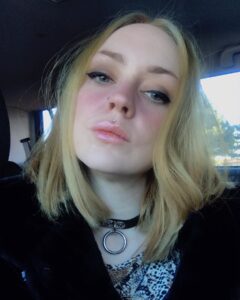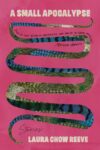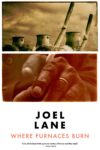 Elle Nash’s short story collection, Nudes, feels like a long time coming for anyone who has been following her work for any amount of time. Her fiction is transgressive and immediate: you feel these stories shoot through and wrap around you. As her characters experience the possibility and the danger of their bodies in space (or hyper-space), our own bodies react with them. These stories are unsettling and powerful, because they are alive.
Elle Nash’s short story collection, Nudes, feels like a long time coming for anyone who has been following her work for any amount of time. Her fiction is transgressive and immediate: you feel these stories shoot through and wrap around you. As her characters experience the possibility and the danger of their bodies in space (or hyper-space), our own bodies react with them. These stories are unsettling and powerful, because they are alive.
Nash and I chatted over the phone about her journey to this story collection, her craft sensibilities, mumblecore, and her addiction to bodies.
Kyle Williams: Before even getting into the stories themselves, I was really delighted by Nudes’s table of contents. The stories are separated into titled parts: Fluffers, Yuri, Pukkaki, Moneyshot, POV, and Snuff. How did you decide on collecting the stories this way? I’m interested to hear about how you think about the difference between a Fluffer and a Moneyshot story, for instance.
Elle Nash: When I was choosing Fluffers, I was looking for stories that would act as a lead-in to the collection. They might not be my favorite stories, but they prepare you for the rest of the book. The rest of the sections, loosely, focus on specific relationalities. The Moneyshot stories have a lot to do with transactional relationships, and that section has a story in it that is more about class than anything else. The Pukkaki stories all have to do with eating disorders – that word is a play on bukkake and, well, puking – and so the focus is on the obscene parts of the experience of having an eating disorder. The Snuff stories all have to do with death, and the ideation of death.
How old is the oldest story in this collection? Do they span a long period of time?
The oldest story is from 2014. 2014 was the year I really started to discover independent literature. I was discovering these online literary magazines, and meeting more writers. Prior to that I had been taking workshops on and off, but I didn’t really know anything about the publishing world. “Joan Jumps Into the Sea” came out in the Offing in early 2015, and that was, in my opinion, my first big publication. To me, the Offing was this really big magazine, and I’d gotten my acceptance almost immediately from Danez Smith and I felt so good about it.
How did it feel going back over stories from seven years ago?
It’s weird, right? Especially because, in a lot of ways, I still feel like a beginner. I still feel like a person who is emerging. My decision to take writing more seriously was eight years ago at this point. Which is crazy – that is such a long period of time, but it’s passed so quickly. There are a couple of things I miss from those early days. I used to be able to write really short pieces, and I felt like I could channel a certain rawness of experience more easily. I wrote with less consideration for what other people would think, because people really weren’t reading me. Now I think about that. I refine a lot more. I think about what I’ll work on next. None of this is necessarily bad, but I miss some of that gritty, fast writing. I used to be running through the field, and now I’m walking and paying attention to every stalk of grass. It’s different.
I did heavily re-edit some of those early stories for Nudes. I consider them remastered and re-released, in a way.
Why do you think your stories are getting longer?
I wish I could say. All my writing tries to expand into a particular atmosphere, whatever atmosphere it is for each story. It might just be that I have more discipline now, and so I can sit in those atmospheres for longer periods of time. But sometimes I do want to go back to compressing, just to see how that would work out for me.
I feel like it’s so much harder to establish atmosphere in such a tightly compressed place, like flash.
True. Something about flash is that it’s a lot more like poetry: You let the experience wash over you, without necessarily questioning it at first. In a longer story, you start to look for patterns, or more traditional elements of craft, right? Whereas a flash piece is a more immediate experience.
What is it about atmosphere that appeals to you? And what exactly do you mean when you use that word?
The closest approximation, I think, would be “tone.” All good writing has this sense of surrounding you, and I chase after that engulfment. When I read, I want to be engulfed by the story. When I read, I want to be brought to my knees. So that’s what I’m always trying to achieve.
Longer stories might be harder – because there is more of it, you have more elements to maintain – but there might also be a better chance that the reader will be more totally surrounded by it, because they’re spending more time in the fictive dream.
I know Animals Eat Each Other, your novel, started as a short story. How do the processes of story and novel writing differentiate themselves for you?
The story that became Animals Eat Each Other was just something I kept expanding and expanding, until I realized it was a novel. After that came out, I worked on stories again. I had another novel I tried to work on, but writing short stories became a really good way to procrastinate writing a novel. And that became a good way to keep momentum, to write every day, turning back and forth from stories to novel.
I don’t think I’ve ever thought about how those processes are different. It’s a feeling. When I sit down to write, I have this feeling of death being at my door. It sounds melodramatic, but I feel like I have to get the story out, and that I only have a certain amount of time to do it. If I sit down to write a first draft and I think it’s going to be a novel, something in my head says I have three months to finish it. If it’s a short story, the voice says I have two or three days.
That’s interesting, those differing scales of immediacy.
When I sat down to write “Nudes,” the title story, I had an idea that I wanted it to be in two parts, I wanted it to be longer than any other story in the collection, and I knew I wanted to finish the first draft of it in a few days. Now, I have this novel manuscript I’m working on. In the first few days I wrote like five thousand words, but knew it wasn’t done yet. I decided to put it aside so I could think more about where I was going – and that’s how it’s different. When it’s a novel I’m thinking more about how I’m going to frame it. When it’s a short story, I’m not thinking about that, I’m letting it take me where it needs to go.
In the atmosphere of your writing, I’m always delighted by the way you let the contemporary world in. In this collection, not just brands – which have been a staple of a certain kind of realist fiction for a while now – but very contemporary cultural artifacts like listicles and livestreams are all over. What draws you to writing about these hyper-contemporary cultural objects? And do you worry about balancing it for your reader?
I do have rules for introducing those kinds of things into a story. For instance, I never mention Facebook or Twitter by name – I hate mentioning social media by name – but I will talk about the “feed.” For a livestream, I would never have my narrator say specifically she’s on Chaturbate or MyFreeCams. I think that introduces some timelessness, representing what the thing is without necessarily naming the thing itself. Because these things do exist in the world: the camsite, the livestream, our timelines; they are part of our world now and they’re always going to exist.
In “Cat World,” however, I did talk about AIM specifically. The reason I did that is because I was trying to bring a certain period and place to the story. AIM is dead now, so it’s transportive in that way.
Brands more generally, I think are really important. Cigarettes, alcohol, even guns: people attach so much identity to the consumer products they have in their lives, that’s a unique facet of capitalism. If you’re a smoker, you have a brand, and you associate that brand with something particular. Everyone has an image of the type of person who only smokes Virginia Slims. So I will use those brands in stories as identity markers – because that’s what they are.
There’s one story in this collection that specifically mentioned mumblecore, which feels really aesthetically related to what you’re doing. I mean this question as at least a little bit of a joke, but: Is this mumblecore literature?
That’s so funny. I think about that a lot, though. I love mumblecore so much, and mumblecore horror especially. It feels like improv, right? More genuine in a way. It doesn’t feel like it has a scripted rigidity, even though they are working off scripts. But I don’t know! Is it mumblecore fiction? Does it feel heavily scripted or more authentically real? I’ll leave that up to other people.
I’m so glad you brought up “Cat World,” by the way, because I love that story. I sent it to everyone I know when it came out in Guernica. Could you talk a little bit about what you were trying to do with that story, and where it came from? It’s such a specific period you’re writing about. Like, is the phrase “ASL” even in use today?
I don’t think we have chat rooms in that way anymore. We have Discord, but that’s a little more niche. And yet, there is still a lot of catgirl roleplay on the internet, right? It’s timeless in a way: catgirl and furry roleplay will always exist on the internet. Which I think is kind of beautiful.
This story’s origin, I think, was in some high school ephemera I had found, and I was like, “What a weird time.” I found notes from friends, from my first high school girlfriend, from right around the time of September 11th. It was really interesting to piece together a narrative of what was happening through those typical high school notes about going to do drugs or listen to System of a Down that at the same time were talking about whether the terrorists did 9/11. I wanted to capture what it was like being in high school at that time.
I have to wonder what the twenty-year anniversary of September 11th will bring into fiction, what it’s going to look like for millennials to explore a catastrophe they lived through as children or teenagers. What that excavation is going to yield.
The most unifying thing to me about Nudes feels like the multifarious investigation of the body: what it is, what it can be, how it’s a trap, how it’s a potentiality. How do you think about approaching the body in a story? Is that a conscious obsession for you?
Totally. I am thinking about the body a lot and all of the time. The body is where the story starts. I’m always thinking about how things feel on the body, and how it’s the tool we use to experience the world. The body filters everything for us; we can’t experience anything without it. Maybe the mind is how we process experience, but even the tension in Western culture over the mind/body duality is interesting, and that compared to non-Western spiritual ideas about a oneness that eschews that duality are also interesting.
When I was learning under Tom Spanbauer, a phrase he used a lot was “Going on the body,” OTB. When there is a moment that needs to be slowed down or viscerally experienced, you go on the body and try to think about how it’s filtering the experience.
I really love that long paragraph in “We Are Sharp Edges” that really dives into what the body is for that narrator. She says things like, “The body is amoral. The body is a tool. The body is a filter.” And I was wondering if that was you speaking, or more your character.
Both! The body is multiple things at once, maybe not everything at the same time. Sometimes I do think the body is a tool, sometimes I don’t. Sometimes the body is a blessing, sometimes it’s a trap. Sometimes I love my body, I love having my body and feel so grateful for it, and other times I want to obliterate it. And I think everyone has these competing experiences with their bodies, so I want to examine those in my characters.
Now I’m also thinking about that line in “Thank You Lauren Greenfield”: “I am addicted to bodies.” It feels like the thematic summary of this collection, in a way.
Definitely, and I do feel that way. I’ve had an eating disorder in the past, and sometimes still struggle with it. I try to be open about that. So I’ve always had this obsession with the human form in various different ways. It’s interesting now, because I’m in a much better place with it, to see how society is obsessed with bodies, with controlling bodies in every aspect. If you don’t have a body that fits to societal standards, people are going to say something about it to control you and to make you conform. But even if you photoshop your body to fit societal standards, like through social media, people are going to say something about that too. If you get surgery to change your body, people are going to judge you for it. Yet if you accept your body fully, people out there are going to judge you for that, too. The body in society isn’t free to just exist.
The body is the clearest boundary you have between yourself and the world. Sometimes that boundary can be protective, but it can also be restrictive in the way people are constantly trying to violate that boundary.
Right, thinking also about the body as a site of commerce, like the camgirl in “Livestream.”
As a tool, the body can be used transactionally in that way. But what’s important about that is that it’s about the perspective of the person who inhabits that body. Because the perspective could be that this is that person’s choice, that this is how they live their autonomy. Bodily autonomy is my most deeply held belief, the idea that this is my body and I will do what I want with it. No one else has any say over that agency.
Do you see yourself as writing into a history of the body? It feels like something that is rising to a new consciousness, considering something like the Kink anthology.
I don’t see myself as writing into the history of anything. But there is so much cultural shame around the body, and around desire, and I hate it. I hate the cultural denial of the body (and bodily autonomy). It’s so Puritan. I’m glad there’s more writing fighting against that, and taking up space.
Nudes
by Elle Nash
SF/LD Books
April 2021
Kyle Francis Williams is a writer living in Brooklyn. He is an MFA Candidate at UT Austin’s Michener Center, Interviews Editor for Full Stop, Director of Communications for Chicago Review of Books, and A Public Space’s 2019 Emerging Writer Fellow. He is on Twitter @kylefwill.
This post may contain affiliate links.







